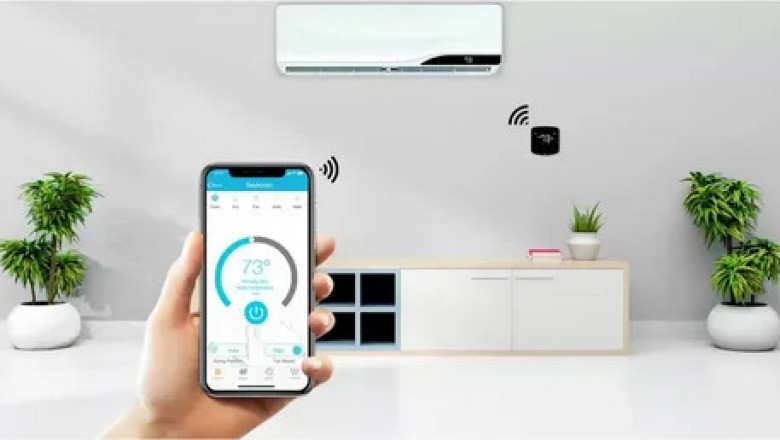views
With rising temperatures and increasing energy costs, choosing the right air conditioner is more important than ever. Traditional AC units have served their purpose for decades, but inverter ACs are rapidly gaining popularity—and for good reason. These modern cooling systems are not just a trend; they represent a significant shift toward energy-efficient, cost-effective, and environmentally friendly climate control. This article explores how inverter air conditioners work, their advantages over conventional models, and why they are a smarter choice for modern homes.
What Is an Inverter AC?
An inverter AC uses advanced technology to regulate the speed of its compressor motor. Unlike traditional ACs, which operate in a start-stop cycle (turning on at full power and then off when the desired temperature is reached), inverter ACs adjust their power based on the room’s temperature needs. The result is a consistent cooling experience, fewer power spikes, and less strain on the electrical system.
In essence, the inverter acts like a throttle, managing the compressor’s speed to maintain a constant room temperature without turning the unit on and off frequently.
Energy Efficiency and Cost Savings
One of the most compelling benefits of inverter ACs is their energy efficiency. Because the compressor runs at varying speeds rather than shutting off completely, it uses significantly less electricity. This can lead to energy savings of 30–50% compared to non-inverter models. Over time, this efficiency translates into noticeably lower electricity bills, making inverter ACs an investment that pays for itself.
For households that use air conditioning frequently, particularly in hot and humid climates, this efficiency can have a substantial financial impact.
Better Temperature Control and Comfort
Inverter ACs provide more stable and precise temperature control. Traditional ACs often cause slight temperature fluctuations because they turn on and off repeatedly. In contrast, inverter ACs maintain a more consistent indoor environment, which leads to greater comfort, especially during long periods of use.
By adjusting the compressor speed gradually, these systems eliminate harsh temperature swings and the loud noises often associated with ACs restarting.
Longer Lifespan and Quieter Operation
The smooth operation of inverter ACs results in less wear and tear on internal components. Since the compressor doesn’t undergo the stress of constant start-stop cycles, its lifespan is extended. Additionally, the reduced strain on electrical parts helps prevent overheating and damage over time.
Another major benefit is quieter performance. Inverter ACs are engineered to operate more silently than traditional units. This makes them ideal for bedrooms, study rooms, and other quiet spaces where noise can be a disturbance.
Environmentally Friendly Cooling
Many inverter ACs use eco-friendly refrigerants like R-32, which have a lower Global Warming Potential (GWP) than older refrigerants. When paired with energy-efficient operation, this makes inverter ACs a greener option for environmentally conscious consumers.
Also, by reducing energy consumption, inverter technology indirectly lowers the demand on power plants, contributing to a reduction in carbon emissions.
Ideal for Smart Homes
Inverter air conditioners are increasingly compatible with smart home systems. Many newer models can be connected to Wi-Fi, allowing users to control them remotely via smartphone apps or integrate them with home automation tools like Google Assistant or Amazon Alexa.
This integration adds a layer of convenience and ensures that users can manage their energy consumption more effectively, even when they are not at home.
Factors to Consider Before Buying
Despite their advantages, inverter ACs are typically more expensive upfront than non-inverter units. However, the long-term savings in energy bills, reduced maintenance costs, and increased lifespan often outweigh the initial cost difference.
Buyers should also consider:
-
Room size: Ensure the AC capacity (measured in tons) matches the room’s size.
-
Star ratings: Higher BEE star ratings indicate greater energy efficiency.
-
Brand and warranty: Go for trusted brands that offer good after-sales service and warranties.
-
Installation: Proper installation by certified technicians is crucial for optimal performance.
Conclusion
Inverter ACs are no longer just a luxury—they are quickly becoming the standard for efficient, quiet, and reliable cooling. With advancements in technology and growing awareness about energy conservation, inverter air conditioners offer a smarter solution for today’s cooling needs. Whether you're upgrading an old unit or choosing your first AC, investing in an inverter model can enhance comfort, save money, and reduce your environmental footprint.
As homes become smarter and more energy-conscious, inverter ACs stand out as a vital upgrade for anyone looking to combine performance with sustainability. In the long run, they offer not just better cooling—but better living.














Comments
0 comment